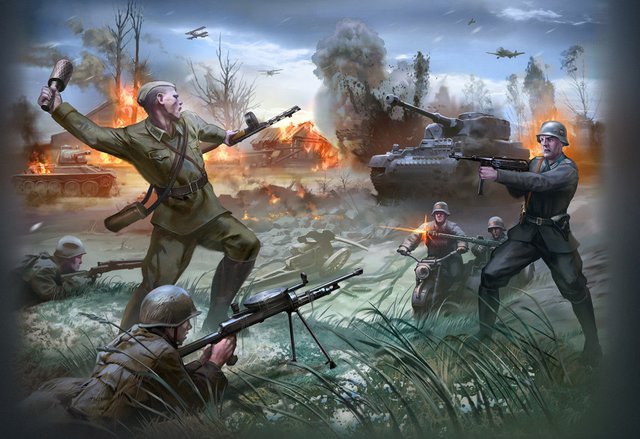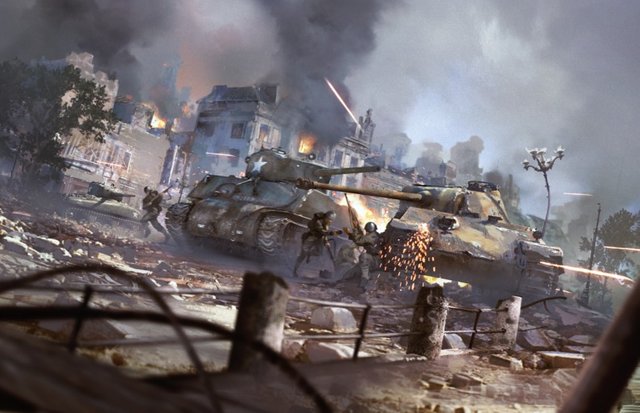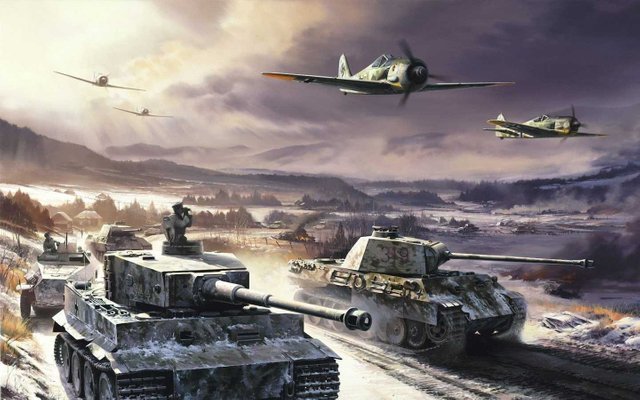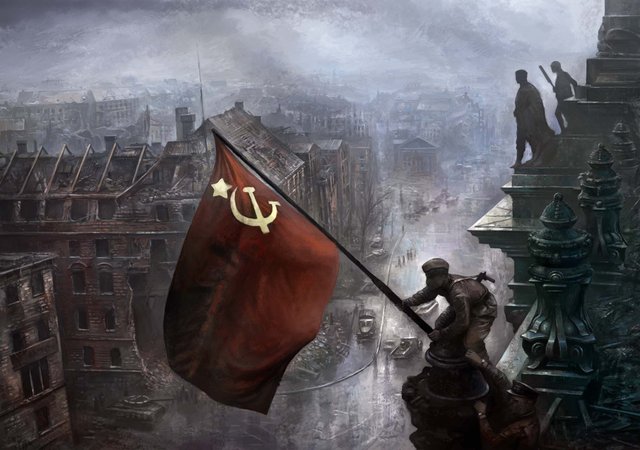Before you go and read my essay on this infamous battle, I want to introduce myself again by giving you a sneak peak of my life. I am a United States Marine and I also attend the University of Delaware pursuing my bachelors in Physics and War Studies. My goal after college is to become a fight jet pilot for the Marine Corps. I have been serving now for two years. I will be slowly introducing myself with every post I put on here!

The battle of Stalingrad was a military confrontation between the Soviet Union and Nazi Germany in 1942-1943. It is considered to be one of the greatest battles of the second world war, and many historians consider it to be the turning point of the war. Operation Barbarossa was aimed at eliminating the communist and establishing a German empire in Eastern Europe. Hitler set his eyes on the major industrial city Stalingrad, where tanks and other equipment were produced for the Soviet war effort. The city sat on the banks of the Volga river, which flows through central Russia, and would be a major strategic point for future German operations. The capture of the city became a priority for Hitler that could cut transport routes to Southern Russia. The city could be used as an anchor for acquiring the oil fields of the Caucasus, as well as a flanking point directly to the Soviet capital of Moscow. The German 6th army fought their way into the city and became cut off and surrounded by Soviet forces and obligated to endure a fierce winter with little food or appropriate clothing. The battle culminated in a major defeat for the Germans, while the triumphant Red Army began a great military operation towards Berlin. Some argue that it was the turning point of the war. The Axis powers suffered staggering casualties, up to 800,000 men and the Soviet Union lost over 1,100,000 men. The reason the Germans lost the Battle is because they relied on weak allies to defend the 6th Army’s flanks.
There are many factors that played a significant role in the defeat of the Germans. Historians argue that some factors have played a more crucial role than others. One being that Hitler greatly overestimated the capabilities of German armies, and underestimated Russia’s willingness to sacrifice for survival. Hitler held a misconception that the German Aryan race was socially and racially superior to the ethnics groups of Eastern Europe, like the Jews and communist. Hitler and Nazi commanders were certain of defeating Russia before the winter of 1942, “The other matter which Hitler was adamant was that his armies could conquer Russia in a matter of weeks” (Hoyt, pp. 29). Hitler did not prepare his armies for a sustained campaign and did not prepare for the worst case scenario. When winter did come around, his armies suffered greatly. Friedrich Klemin, a German soldier during the Stalingrad siege, describes the battle through a personal memoir, “For four hours I moved on two hands and one good leg through ankle-high snow towards my objective” (Busch, pp. 111). Klemin’s objective was an airfield as he was being evacuated to Germany, due to a frozen leg. Gustav Kaminski, another German soldier, described how even with shelter, soldiers would die due to low temperatures, “Or did I want to freeze like those inside?” (Busch, pp.111). Even though Hitler overestimated Germany’s capabilities. The Wehrmacht were still better equipped and better trained than the average Soviet soldier. During winter, Soviet forces who were equipped for the winter still lost equal or far more troops than the Germans. Russia’s pyrrhic victories throughout the war show that winter was not the factor that ended operational capabilities for Germany in the east and at Stalingrad. This factor is important however. “Before the arrival of winter, Hitler's armies had already suffered a staggering 734,000 troops and were low on supplies before the arrival of the 1941 winter.” (Chew, pp. 58). Winter simply made the situation more difficult. When Russia and Germany fought on equal conditions, Germany always won unless outnumbered. Even though this is influential on the outcome of the battle it is not the reason why they lost.

Another factor in which is argued for the defeat of the Germans in the battle was due to its tanks not being as effective in Russia’s terrain and climate. That they were unmatched by Russia’s T-34 tanks under these conditions. German tanks needed good weather conditions and were not capable of operating to well in heavy snow. The tanks were also not able to cross certain terrains like frozen tundra or wetlands.

The Russian winter began to take a toll on the German 6th army, and when spring came, water from the snow would not defrost away because the underneath layer of soil remained frozen creating a slushy upper layer. German tanks being heavy and not properly designed would constantly get stuck. The tanks were dependent on weather conditions, which would slow military operations or maneuvers. “The Germans had nothing to match the Soviet T-34 tanks, which could maneuver on the frozen swamp soil, … but when the weather improved, the Germans attacked at the initial point of Soviet breakthrough,...” (Stone, pp. 97). German tanks are crucial for open terrain warfare, However, they are useless for combat inside cities. At Stalingrad most of the fighting inside the city was conducted by ground troops not mechanized armour. Tanks only played a major role outside of the city, but for the most of the campaign it was already under German occupation and there was not much fighting.

Another point of argument was the supply lines of the Germans, which were not fully mechanized and used animals. Stalin, throughout his reign was willing to cause suffering to the masses for his political or militaristic goals. His Scorched Earth Policy was intended to starve and slow the Germans as they advanced deeper into Soviet territory. It forced peasants and civilians to burn farmland and resources that may have been used by the invaders. This forced Germany to draw its supplied from a far, which took the Germans longer to supply its armies the further they advanced into Soviet territory. The distance from Berlin, even the country’s border, to stalingrad became immense. The Wehrmacht were not mechanized and relied heavily on horse power to transport supplies, “...German armies were far from total mechanization. In 6th army alone, more than twenty-five thousand horses moved guns and supplies” (Craig, pp. n.a). The carrying capacity of horses was limited compared to mechanized vehicles, and most of these animals were not well fed reducing their ability to transport. Horses and animals take time to cover vast distances, as they need periods to rest and recover. “The Wehrmacht trucks were tied to the few, notoriously poor paved roads, and the vast numbers of horse drawn wagons were painfully slow in dragging their way through the boggy paths that formed most of the country's land infrastructure” (Kennedy, pp. 181). The unreliable vehicles and the limitations of the animals caused stretched supply lines. Fuel shortages, the distance, and inefficiency to maintain mechanized vehicles operational ability caused poor supply lines for the Wehrmacht, “German supply lines were stretched to the limit,...” (Walsh, pp. n.a). Although the German armies were not fully mechanized and Stalin's scorched earth policy weighing heavily on the Nazi’s. They were capable of conducting military operations far into Russian lands. These factors slowed German advance but they were not the terminal factor that turned the tide at Stalingrad. Though they were very influential on the German Campaign.
Historians also argue that the poor support of the Luftwaffe during the campaign was not very effective, that allowed the Germans to continue to be tied up, while the Russians built up troops to perform an outflanking maneuver. The Luftwaffe was severely weakened during the Battle of Britain. Germany was not able to replace pilots as fast as the allies and much of the air force was used for the defense of German cities. Across the eastern front, German machinery felt a shortage of fuel and the Luftwaffe was spread too thin across the eastern front. Germany had retained air dominance for most of the campaign at Stalingrad. However, they lost superiority after the Wehrmacht got surrounded. During this time, Russia used its air power to suppress the Luftwaffe and restrict German movements on the ground and resupply by air as best as they could. Germany still kept a strong presence in the air, but they still lost dominance on the ground. The weakness of the Luftwaffe played a factor, but is not as important as the German relying on incompetent allies to defend the 6th army’s flanks. The most important factor that led to the defeat of the Nazi’s at Stalingrad was the collapse of the Axis flanks south and north of the city. The reason this factor is more important than the rest is because it seriously weakened the Germans ability to conduct military operations. The Wehrmacht operational capabilities only allowed for a defensive force after being encircled. They were almost completely cut off and receive little to no effective support from surrounding allies. Friedrich Klemin, described the food situation saying that soldiers for the most part lived on rations of melted snow and biscuits. The food rations were so bad that the Luftwaffe stopped airdropping ammunition to the entrapped soldiers and instead began focusing on food. Even with the Luftwaffe supplying food it was not remotely enough to feed the soldiers. An army that is unfed breaks down in all aspects of war fighting capabilities. This causes soldiers to lose morale and become physically incapable of performing physical or combat activities. What led to the situation is a direct result of being encircled due to the collapse of the 6th’s flanks. Poor intelligence and Hitler’s racial beliefs set the stage for the circumstances. However, the Germans knew that its flanks were weak and all the disabilities of the Hungarian, Italian, and Romanian forces, “The Germans knew 6th Army’s flanks vulnerable, but the solution was perceived to be the capture of Stalingrad.”(Walsh, pp. 109). The German allies were poorly trained, equipped, and prepared for battle. The Axis allies were not loyal to Hitler, and did not want to be there. For most of them, giving up their lives was not an option and they did not fight with ferocity. Most of the Hungarian and Romanian forces were also staffed by officers that were not taught warfare. If the commander of a unit is incompetent then the entire force is made obsolete and will fall to disunity and chaos. Small unit leadership is important in keeping the force together during very chaotic and frightening times. If the commanders are incapable of keeping unity, then that side will lose. This is exactly what happened to the Axis. The Soviets, even with bad equipment, still had updated and better weaponry compared to the German allies. They were equipped with World War One weaponry and equipment. In war, the side that is better organized and better technologically equipped is more likely to win. In addition, their forces were stretched too thin and an attack could easily puncture through. The group was tasked of defending a hundred kilometers with only a few soldiers at some places. All these factors lead to a subpar fighting force that is incapable of fighting a better organized opponent.

The fall of the 6th Army’s flanks amplified the defects of the operation by severely straining the Axis. The German encirclement was the first domino that collapsed the campaign and hope for the Germans. They were not able to recover and would lose a great deal of manpower. Every factor and argument that could have led to the defeat of the Germans were important, but they simply set the stage for a catastrophic end. The point were the Germans lost the capacity to conduct large scale military operations and sustain it, due to loss of morale or cut off from supply, happened precisely when its flanks were taken. The pocket of Germans could not receive supplies or help and were doomed to surrender, starve, or freeze to death.The fall of the flanks is the reason why the Germans lost the battle.
Adam, Wilhelm; Ruhle, Otto (2015). With Paulus at Stalingrad.
Baberowski, J. (n.d.). Scorched earth: Stalins reign of terror.
Bergström, C. (2007). Stalingrad: The air battle: November 1942-February 1943. Hinckley: Midland.
Busch, R., Brooks, G., & Moorhouse, R. (2014). Survivors of Stalingrad: Eyewitness accounts from the Sixth Army, 1942-1943. London: Frontline Books.
Chew, A. F. (1982). Fighting the Russians in winter: Three case studies. Fort Leavenworth, Kan.: Combat Studies Institute, U.S. Army Command and General Staff College.
Craig, W. (2003). Enemy at the gates: The battle for Stalingrad. New York: Barnes & Noble Books.
Hellbeck, J. (2016). Stalingrad: The city that defeated the Third Reich. New York: PublicAffairs.
Hoyt, Edwin. (1993). 199 days: The battle of Stalingrad. New York: Tor.
Kennedy, P. M. (2014). Engineers of victory: The problem solvers who turned the tide in the Second World War. London: Penguin Books.
Stone, N. (2014). World War Two: A short history. London: Penguin Books.
Walsh, S. (2013). Stalingrad, 1942-1943: The infernal cauldron. London: Amber Books.
Magnifico relato que se convierte en bello archivo para recordar.
Downvoting a post can decrease pending rewards and make it less visible. Common reasons:
Submit
War is a nasty real game of our fathers which up to now happens in all corners of the world and it makes me sad. Why should things like this happen when we all can support and love each other? It's very easy to ask why but it happens. I just thought, may the good ones win.
Downvoting a post can decrease pending rewards and make it less visible. Common reasons:
Submit
Hi, Do You Know We Love You and Everything You Do.
Thank you, @dreamants, for spending your time on the STEEM Network.
We put together some statistics about your account, let us know if you have questions.
Votes Per Post Average: 660.7333333333333
Replies Per Post Average: 5.2
Post Word count Average: 1036.7333333333333
Follow us for more benefits. Help Us Grow Delegate STEEM Power 1SP, 5SP, 10SP, 100SP, or Donate to Help Support
Have a Great Day,
@WeLoveYou.
We can also resteem and upvote more of your posts
Learn More, Read Our Introduction
If your reputation is lower than 30 resteeming with @WeLoveYou only costs 0.001 SBD
Downvoting a post can decrease pending rewards and make it less visible. Common reasons:
Submit
This post has received a 16.81 % upvote from @booster thanks to: @dreamants.
Downvoting a post can decrease pending rewards and make it less visible. Common reasons:
Submit
You got a 5.00% upvote from @upmewhale courtesy of @dreamants!
Earn 100% earning payout by delegating SP to @upmewhale. Visit http://www.upmewhale.com for details!
Downvoting a post can decrease pending rewards and make it less visible. Common reasons:
Submit
Nice story
Downvoting a post can decrease pending rewards and make it less visible. Common reasons:
Submit
Downvoting a post can decrease pending rewards and make it less visible. Common reasons:
Submit